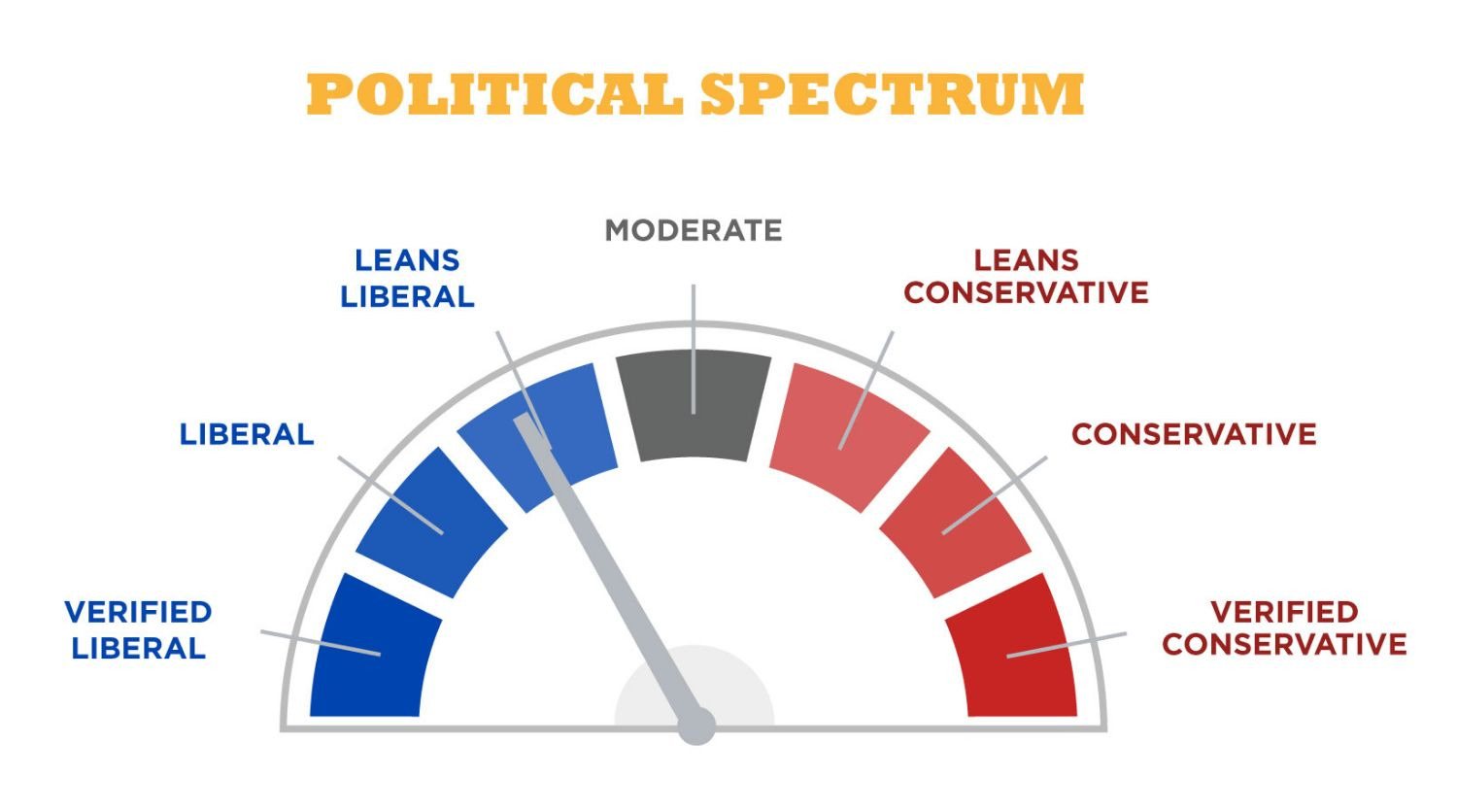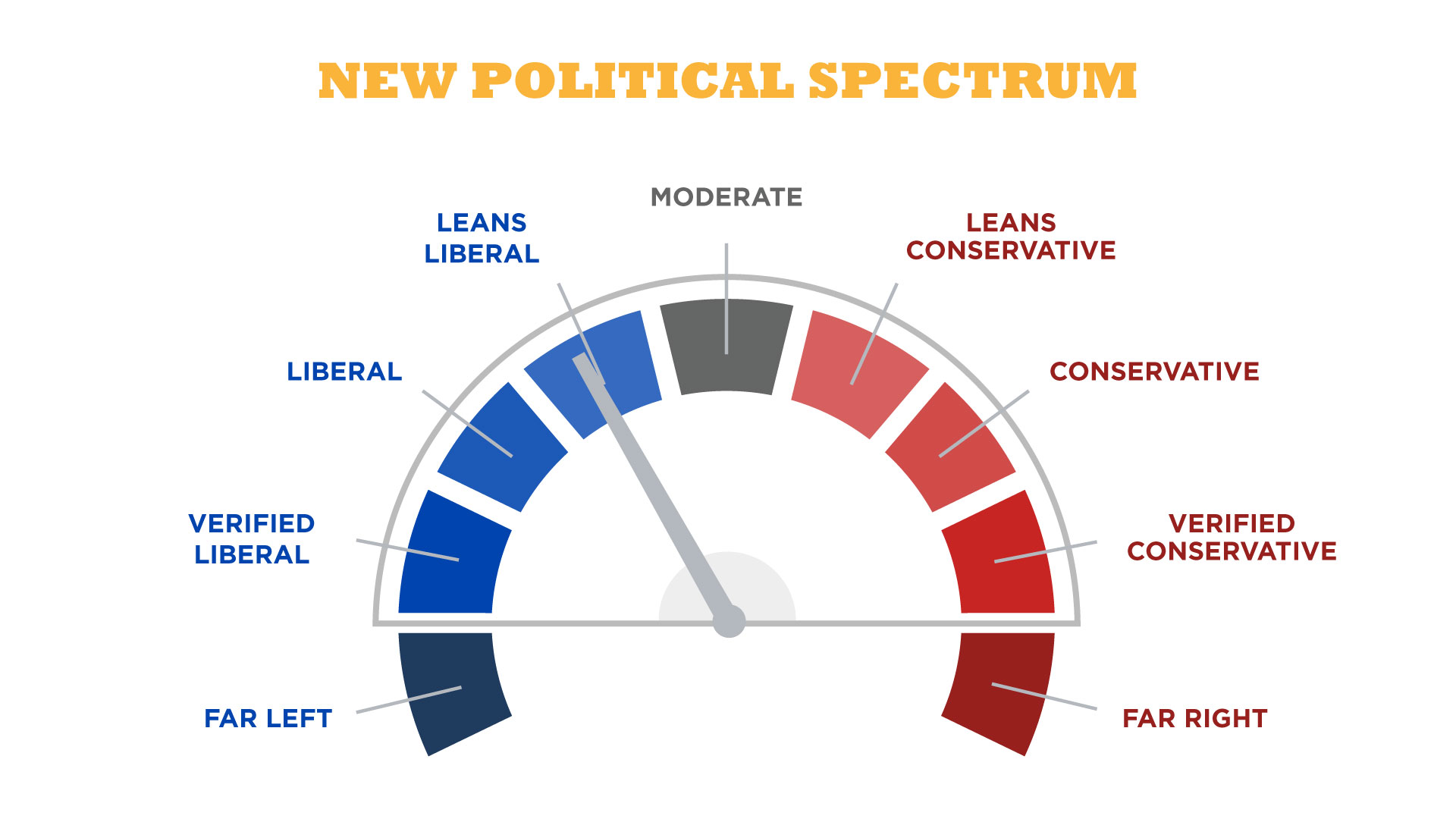Understanding
Candidate Evaluations
What makes iVoterGuide stand out from other voter guides?
In addition to our factual research, we assign a political philosophy evaluation to each candidate. This evaluation is designed to help you, the voter, understand how the information we’ve collected indicates the way a candidate will likely govern.
We've written this guide to help you really understand our evaluations. The article is longer than usual, so grab a cup of coffee and settle in for a long read . . . but one that will help you make wise choices based on our hours of research.
If enough information is available to evaluate a candidate, he or she will likely fall inside the typical range of Conservative to Liberal beliefs, with varying degrees:

Our evaluations are not an endorsement of a candidate, nor are they an indication of the candidate’s chances of winning. A candidate’s evaluation is assigned solely based on our assessment of how they will vote if elected, not on their personality. Consequently, it is possible for several candidates to receive the same evaluation who are running for the same seat.
- The strongest evaluations within the spectrum are “Verified Conservative” or “Verified Liberal.” The term “verified” reflects the fact that only candidates who have a voting record or have taken public action demonstrating a commitment to conservative or liberal principles, despite significant pressure, are eligible to receive this evaluation.
- The next strongest, “Conservative” and “Liberal,” reflect candidates who appear to have solid conservative or liberal values based on information such as donations, endorsements, and public statements. Without having a strong voting record, however, the candidate is unproven as “Verified Conservative or Liberal.”
- “Leans Conservative” or “Leans Liberal” evaluations are for candidates with a mix of liberal and conservative beliefs. All issues considered, the candidate leans toward one side of the political spectrum and therefore did not receive a moderate evaluation. However, he or she possesses enough beliefs from the other side to prevent a solid liberal or conservative evaluation.
- A “Moderate” candidate may be liberal on some issues and conservative on other issues. Overall, the candidate does not have any consistent leaning as a conservative or liberal.
Further information on our evaluations is available on our FAQ page.
How do we define Liberal and Conservative?
The terms “liberal” and “conservative” have different meanings . . . depending on whom you ask! iVoterGuide defines these labels in terms of the God-ordained purpose of government—to serve Him for the good of individuals. (Romans 13)
It should be noted that principles regarding the proper relationship between government and its citizens are able to be discovered and acknowledged even by candidates who do not necessarily believe in the God of the Bible. They are “self-evident,” as the Declaration of Independence states.
In general, we define a conservative candidate as someone who, to varying degrees, generally holds these key principles:
- Limited government—able to restrain evil, yet itself restrained within proper limits of authority
- Individual liberty—particularly, the freedom to seek God and the opportunity to use our faculties for His glory
- Free enterprise—utilizing our abilities to provide for ourselves and our families, and bless our community
- Eternal truths—such as the right to life, the essentialness of the biblical family structure, and the importance of national boundaries
- Peace through strength—in the words of George Washington, “. . . if we desire to secure peace… it must be known that we are at all times ready for war.”
We define a liberal candidate, on the other hand, as someone who generally holds principles such as:
- More government control—in an effort to solve all or most societal ills
- Individual license instead of liberty —rejecting self-restraint that leads to freedom
- Greater regulation of enterprise—to produce equal outcomes, based on the belief that economic success always comes at another’s expense
- Rejection of eternal truths—instead pursuing human ideas of “progress”
- Peace through diplomacy alone—often not recognizing that the enemies of the United States don’t desire peace, but the annihilation of America
Two New Evaluations: Far Left and Far Right
Based on our candidate research over the past few years, we determined that the spectrum of Conservative to Liberal evaluations was no longer sufficient to capture all philosophies in the changing political landscape. Notably, during the course of our research, we encountered numerous candidates whose stated beliefs regarding government control met or exceeded the Verified Liberal category. Many of these candidates only received the less-strong evaluation of Liberal, however, because they lacked a voting record or had not taken publicly verifiable action on behalf of their principles.
Therefore, iVoterGuide has created two new evaluations: Far Left and Far Right. These evaluations are reserved for candidates with extreme views regarding the government’s role.

Far Left
The Far Left evaluation describes candidates who consistently advocate for centralized, authoritarian government control advancing a secular worldview in lieu of respect for individual rights. While a Far Left candidate will have publicly verifiable information indicating such beliefs, a voting record is not required to receive this evaluation.
In addition to espousing Liberal beliefs, Far Left candidates consistently express public support for such views as:
- Infanticide
- Suppression of free speech, or a documented cancelling of those with whom they disagree
- Advocacy of re-education programs for Christians and/or conservatives
- Nationalization of private industries
- Cradle-to-grave welfare
- Asserting children belong to the state
- Equating Western civilization with white supremacy
In sum, the Far Left evaluation describes a candidate whose political philosophy reflects a totalitarian view of society and government.
Far Right
Candidates are eligible for a Far Right evaluation if they have taken a firm public stand advocating for no civil government. It is unlikely anyone holding a Far Right position would be seeking government power, especially through the electoral process.
- Far Right candidates may hold positions consistent with:
- Anarchy – no government authority
- Separation or secession from government authority
- Established groups who do not recognize their citizenship in the United States, only their responsibilities to a person, sect, or religion
A Far Right evaluation is essentially the opposite of Far Left when it comes to the issue of government control.
It is important to note that our Far Right definition does not fit the common narrative and descriptions about what is considered Far Right. What some might describe as Far Right, such as the KKK, radical Islam or White supremacy, we would evaluate as “Unclassifiable” (see our definition below). Unlike in the mainstream narrative, a Far Right philosophy is not an extension of the conservative spectrum, since conservatives believe that civil government has a legitimate purpose in society.
Unclassifiable
Lastly, the Unclassifiable evaluation describes a candidate who may possess some liberal or conservative views but who has published or posted material unacceptable to both liberals and conservatives. For example, a candidate who posts pornographic material, is anti-Semitic, advocates race-based supremacy, etc.
What is the value of a political philosophy evaluation?
Too much is at stake to cast a vote according to personality or appearance. It would be quicker to simply collect and publish information about each candidate without any explanation or evaluation. However, this further step of assigning an evaluation to each candidate’s ideology is absolutely crucial to informing voters. We view our work as a ministry to voters who hold Judeo-Christian values. Therefore, we seek to provide as helpful a guide as we possibly can.
I encourage you to share this unique resource with your friends and family. Many don’t vote because they lack reliable information about their candidates’ beliefs, and an understanding of how those beliefs impact policy. Through this guide, we can change that.